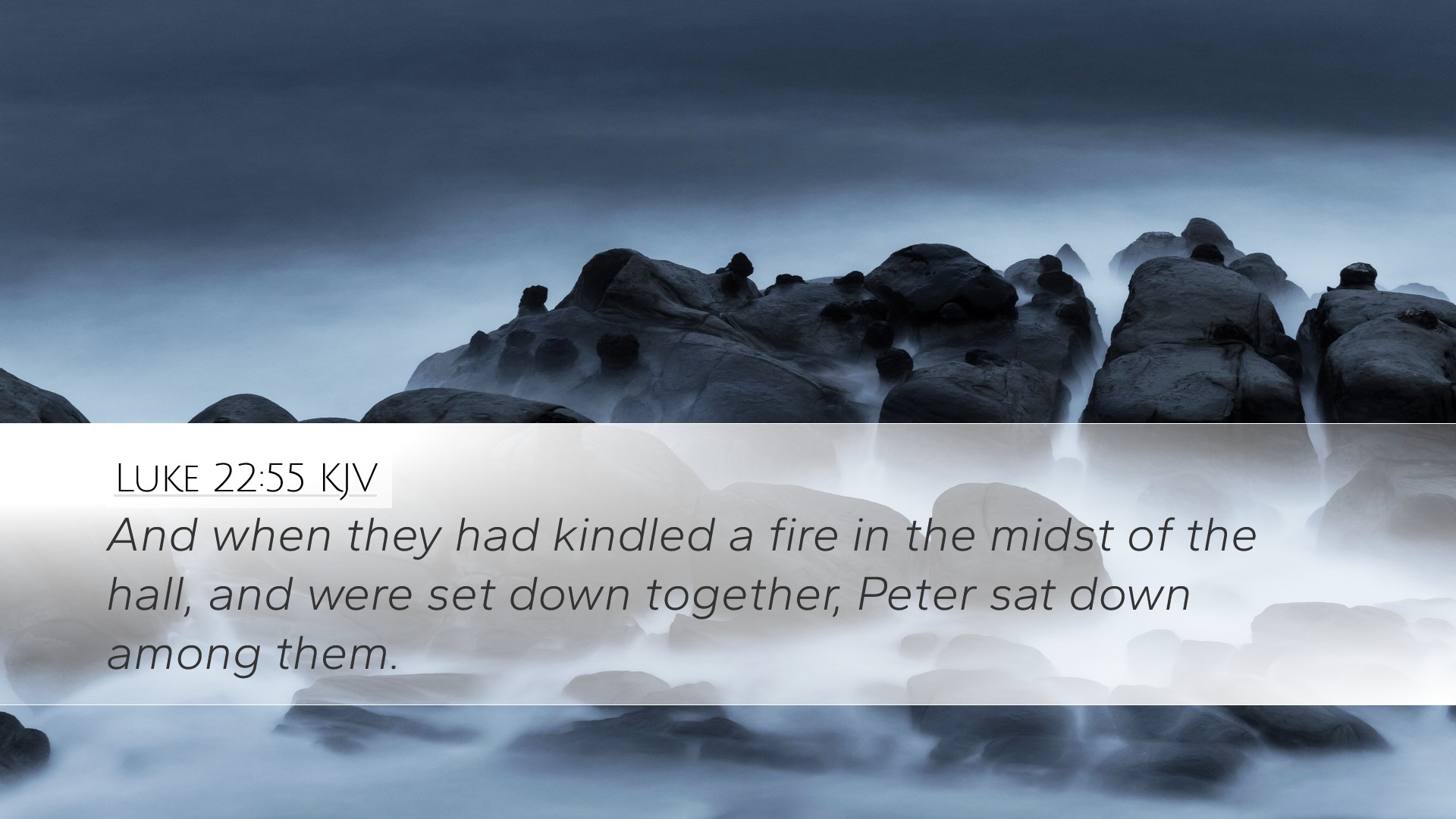Commentary on Luke 22:55
Verse Context: Luke 22:55 occurs during the events immediately following Jesus' arrest, as Peter follows Him to the high priest's palace. This moment is pivotal not just for Peter’s denial but also for the unfolding narrative of Jesus’ journey toward crucifixion.
Overview of the Passage
In this verse, we see Peter in a vulnerable position, among the crowd that had seized Jesus. Luke 22:55 draws attention to Peter's proximity to the unfolding drama, showcasing his internal struggle as he grapples with the fear of identification with Jesus. This moment is emblematic of human frailty in the face of social pressure.
Insights from Matthew Henry
Matthew Henry's Commentary emphasizes the significance of this moment in Peter's life. He underscores how Peter, who had previously professed unwavering loyalty to Jesus, now finds himself in a precarious situation. Henry points out that Peter's following at a distance—a metaphorical separation from Christ—captures the essence of fear and shame that often accompany the trials of faith.
Henry elaborates that this circumstance reveals the tendency in human nature to succumb under pressure. He notes how Peter’s denial reflects a broader theme of discipleship: when faith is tested, the human heart often betrays its commitments, revealing a need for divine strength and grace.
Insights from Albert Barnes
Albert Barnes' Notes on the Bible sheds light on the historical and cultural context of Peter's actions. Barnes explains the environment wherein Peter is compelled by fear to disassociate himself from Jesus. He brings attention to the social dynamics of the time, where identifying with a convicted criminal could endanger one’s life.
Barnes also elaborates on the implications of Peter's actions for believers today. He posits that this moment illustrates the struggle faced by many disciples when confronted with hostility towards their faith. This denial serves as a reminder of the necessity of spiritual vigilance and the dangers of complacency in one’s relationship with Christ.
Insights from Adam Clarke
Adam Clarke’s Commentary offers a penetrating analysis of human psychological response in the face of persecution. Clarke writes that Peter's denial was not just an act of cowardice but also an instinctual reaction to the threat posed by the surrounding crowd. He highlights that this narrative serves as a powerful lesson on the importance of steadfastness in faith, even amidst adversity.
Clarke reflects on Peter’s subsequent remorse, emphasizing that this moment of weakness is pivotal for understanding redemption. He points out that while Peter faltered, this denial did not signify the end of his ministry; rather, it set the stage for his restoration and eventual empowerment by the Holy Spirit. This highlights a foundational truth of the Christian faith: God’s grace is capable of restoring those who have fallen.
Theological Implications
From the combined insights of these commentators, several theological implications emerge:
- The Nature of Discipleship: The passage serves as a testament to the complexities of following Christ. It illustrates not only the vulnerabilities that accompany faith but also the grace that facilitates restoration.
- Human Weakness and Divine Strength: The juxtaposition of Peter’s denial against Jesus’ unwavering resolve highlights the reality of human frailty and the necessity for divine assistance in the Christian walk.
- Redemption and Restoration: The eventual reinstatement of Peter post-resurrection emphasizes the abundant grace of God and serves as a reminder that failures do not disqualify believers from future service.
Application for Contemporary Believers
The lessons derived from Luke 22:55 are immensely applicable for contemporary believers. Pastors, theologians, and students can draw from this narrative to foster discussions on the nature of suffering, the temptation to conform, and the importance of mutual accountability within the community of faith.
- Vigilance: Believers are called to remain watchful against the distractions and fears that might lead to compromise.
- Supportive Community: The significance of a supportive church community becomes evident, as accountability and encouragement can help believers remain steadfast in their faith.
- Understanding Grace: This passage serves as a profound reminder of the depth of God's grace that not only forgives but also empowers believers to rise after a fall.


